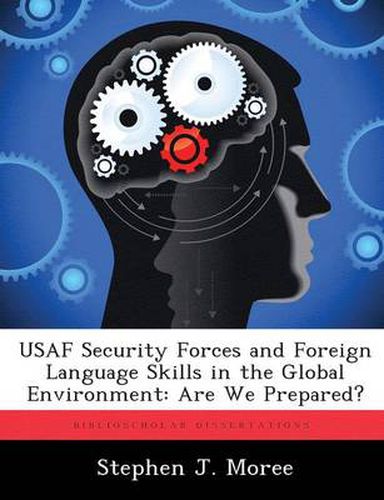Readings Newsletter
Become a Readings Member to make your shopping experience even easier.
Sign in or sign up for free!
You’re not far away from qualifying for FREE standard shipping within Australia
You’ve qualified for FREE standard shipping within Australia
The cart is loading…






This title is printed to order. This book may have been self-published. If so, we cannot guarantee the quality of the content. In the main most books will have gone through the editing process however some may not. We therefore suggest that you be aware of this before ordering this book. If in doubt check either the author or publisher’s details as we are unable to accept any returns unless they are faulty. Please contact us if you have any questions.
Since the end of the Cold War, the USAF has become a small, CONUS-based expeditionary force. Our missions are increasingly combined in nature, and we depend heavily on Host Nation Security Forces (HNSF) to provide our overseas security. In this environment, foreign language skills are extremely important. However, the USAF Security Forces, without a reliable method to develop and employ these skills, is ill-prepared to operate at maximum capability in this new environment. In the critical mission areas of Force Protection (FP) and Air Base Defense (ABD), SF must rely on Host Nation Security Force Personnel (HNSFP) to provide forces and intelligence. However, the SF must rely on the HNSFP to speak English, hire civilian national translators, or borrow qualified personnel from other USAF units to facilitate communication. Utilizing these methods, the SF commander is not assured of rapid, accurate, and reliable communication with HNSFP. There are ways to alleviate the problem. Possible programs include creating SF Foreign Area Officers, and training NCOs as linguists. Also, the SF should include linguists in all deploying SF units, utilizing any qualified person to fill the position. Also, the SF need to improve the hiring and training of host nation civilian translators, and encourage the assignment of dedicated host nation military personnel to in-place SF. Without SF action to address this problem, mission accomplishment overseas will become increasingly more difficult and complicated.
$9.00 standard shipping within Australia
FREE standard shipping within Australia for orders over $100.00
Express & International shipping calculated at checkout
This title is printed to order. This book may have been self-published. If so, we cannot guarantee the quality of the content. In the main most books will have gone through the editing process however some may not. We therefore suggest that you be aware of this before ordering this book. If in doubt check either the author or publisher’s details as we are unable to accept any returns unless they are faulty. Please contact us if you have any questions.
Since the end of the Cold War, the USAF has become a small, CONUS-based expeditionary force. Our missions are increasingly combined in nature, and we depend heavily on Host Nation Security Forces (HNSF) to provide our overseas security. In this environment, foreign language skills are extremely important. However, the USAF Security Forces, without a reliable method to develop and employ these skills, is ill-prepared to operate at maximum capability in this new environment. In the critical mission areas of Force Protection (FP) and Air Base Defense (ABD), SF must rely on Host Nation Security Force Personnel (HNSFP) to provide forces and intelligence. However, the SF must rely on the HNSFP to speak English, hire civilian national translators, or borrow qualified personnel from other USAF units to facilitate communication. Utilizing these methods, the SF commander is not assured of rapid, accurate, and reliable communication with HNSFP. There are ways to alleviate the problem. Possible programs include creating SF Foreign Area Officers, and training NCOs as linguists. Also, the SF should include linguists in all deploying SF units, utilizing any qualified person to fill the position. Also, the SF need to improve the hiring and training of host nation civilian translators, and encourage the assignment of dedicated host nation military personnel to in-place SF. Without SF action to address this problem, mission accomplishment overseas will become increasingly more difficult and complicated.